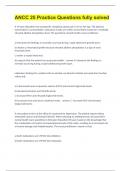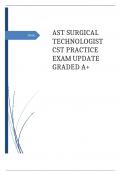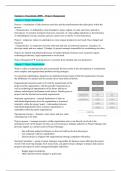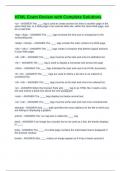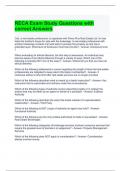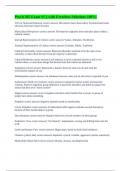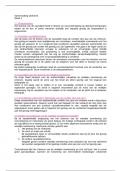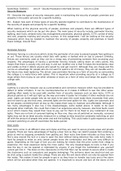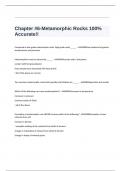Organiza(on and Power
All lecture notes – English 2023/2024
,Table of content
Lecture 1. Introduc.on organiza.on and power .............................................................................................. 3
Lecture 2. A Historical perspec.ve: Bureaucracy, efficiency & forms of control, Taylorism ............................... 8
Lecture 3. The key social dynamic: Agency and structure: ins.tu.ons, interac.ons, and inten.ons............... 14
Lecture 4. dimensions of power: different ways of how power is exercised and possibly resisted .................. 26
Lecture 5. Democra.za.on and distributed power: dimensions of power ..................................................... 30
Lecture 6. Workplace surveillance ................................................................................................................. 43
Lecture 7. Iden.ty regula.on: power implica.ons of being strongly iden.fied with work ............................. 51
Lecture 8. Management consultancies & Cultures of Fun .............................................................................. 59
Lecture 9. Paradoxes and Organiza.onal deviance and complexity................................................................ 67
Lecture 10 . Leadership, complexity and power ............................................................................................. 77
Lecture 11. Ecosystems and climate change .................................................................................................. 82
Lecture 12. Ins.tu.onal theory in organiza.on studies ................................................................................. 96
Q&A – Course Wrap up and exam prepara.on ............................................................................................ 105
Voluntary group Assignment ....................................................................................................................... 109
Exam ques.ons/ Themes 2023-2024 ........................................................................................................... 112
2
,Lecture 1. Introduc3on organiza3on and power
Kees Boersma
Patrizia Hoyer
Bernhard Resch
What is an organiza,on?
- Although most of us” know an organiza@on when we see one”, the diversity and
complexity of organiza@ons and their ac@vi@es is difficult to capture in a single formal
defini@on.
- As a result, mul@ple, some@mes contrary, concep@ons of organiza@ons exist, each
one highligh@ng par@cular features of organiza@ons, but necessarily providing only
par@al and incomplete views.
Dead Poets Society (film)
- Teaching poetry to young adults
- Doing it in such a way, that makes them enthusias@c.
- What does it try to get across?
- “I stand upon my desk to remind myself that we must constantly look at things in a
different way” (taking a different perspec@ve)
- “it disconfirms some (but not all) of the assump@ons held by its audience’ (Bartunek,
Rynes and Ireland, 2006).
Three challenges:
- What exactly did authors want to make clear? And what was special to their
contribu@on?
- Link the academic text to current studies and ‘grand challenges’ (such as climate
change, globaliza@on, safety, security and rapid urbaniza@on).
o How to apply these insights in recent prac@ce?
o What has changed over @me?
- What is the use of theorizing on organiza@ons and power?
Theorizing on Organiza,ons and Power
It is not about theory versus prac@ce used in everyday language, but about:
- Informed knowledge claims
- General structure of character of events
- Deepen our understanding.
- Conceptualiza@on
- Forms: explanatory, interpre@ve, emancipatory
Cornelissen, Höllerer and Seidl (2021)
What is a theory?
- A theory is “a set of interrelated constructs (concepts), defini@ons and proposi@ons
that present a systema@c view of phenomena by specifying rela@ons among
variables, with the purpose of explaining and predic@ng the phenomena” (Kerlinger,
1986: 9) – Quan@ta@ve analysis, hypothesis
Theory and conceptual models
3
,Social iden@ty is a person’s sense of who they are based on their group membership(s). Tajfel
(1979) proposed that the groups (e.g. social class, family...) which people belonged to were
and important source of pride and self-esteem.
Grounded theory:
- Grounded theory is a complex itera@ve process.
The research begins with the raising of genera@ve ques@ons which help to guide the
research but are not intended to be either sta@c or confining. As the researcher
begins to gather data, core theore(cal concepts are iden@fied. Tenta@ve linkages are
developed between the theore@cal concepts and data. (Glaser and Strauss)
What is theory?
- Paradigm
- Heuris@c
- Window, glasses (see the world in different colours)
- It gives a window to the real life world
- Theory helps seeing things differently
The focus is. Not so much on efficiency and effec@veness (or management tools), but on
understanding (verstehen).
- Different social scien@fic themes, methods, and theories are useful
- Embedding in social phenomena and developments is crucial
Common sense, various defini@ons, biases…
Organiza,ons: defini(ons
- Organiza@ons “are social en@@es that are goal-oriented; are designed as deliberately
structured and coordinated ac@vity systems and are linked to the external
environment.” (Dak, 2004)
- Organiza@ons “is a system of consciously coordinated person ac@vi@es or forces”
(Chester Barnard)
- Organiza@ons are arenas of power where discursive struggles take place (Maguire &
Hardy, 2006)
- Or authors deny the existence of ‘organiza@ons’ and prefer to talk of processes of
‘organizing’ (Tsoukas & Chia, 2002)
Rather than defining what organiza@ons is we try to define the process of what organizing is.
- The view we adopt in this course comes close to Baum and Rowley’s (2002: 2)
o Most words ending in “-@on” are ambiguous between process and product –
between the way one gets there and the result. Our word, organiza@on,
shares this ambivalence, itself referring ot the process of “organizing” or to
the result of organizing.
- The defini@ons together …
4
, Themes:
- Ins@tu@ons
- Iden@ty
- Iden@fica@on
- Methodology
- Resistance
- Influence
- Performance
- Decision-making
- Agenda sepng
- Control
- Culture
- Collabora@on
- Conflict
- Ciritcal theory
- Change
- Structure
- Sensemaking
What makes research interes,ng? (Bartunek et al., 2006)
- Counterintui@ve insights:
o What makes scholarly work interes@ng is that it disconfirms some (but not
all) of the assump,ons held by its audience (Davis, 1971)
- Other aspects
o High quality, good wri@ng, new theory or findings, prac@cal implica@ons, high
impact
- Possible outcome
o Produces a higher degree of learning.
o Might lead to more graduate students.
- Interes@ng for whom: academics
First reading of today:
- Bartunek et al. (2006)
- What makes research interes@ng? That depends on what the readers find interes@ng.
How can we say generally that something is interes@ng or not?
o What makes research so interes@ng?
- Most fundamental: what makes research interes@ng is that it disconfirms some (but
not all) of the assump,ons held by its audience (Davis, 1971)
- It needs to catch your aqen@on “this is how I thought the world is…”
Second ar,cle: Cornelissen et al., 2021
- What is theory and what can it be?
o Explanatory
§ Theorizing that aims to explain a topic
§ Builds on prior theore@cal work
§ Scien@fic ar@cles with a standard structure
5


